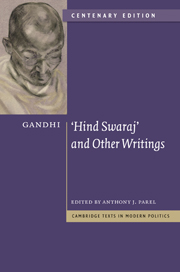Book contents
- Frontmatter
- Contents
- Preface to the centenary edition
- Acknowledgements
- Editor's introduction to the centenary edition
- Editor's introduction to the 1997 edition
- A note on the history of the text
- Principal events in Gandhi's life
- Biographical synopses
- Guide to further reading
- Glossary and abbreviations
- HIND SWARAJ
- Contents
- Preface to the English translation
- Foreword
- I The Congress and its officials
- II The Partition of Bengal
- III Discontent and unrest
- IV What is Swaraj?
- V The condition of England
- VI Civilisation
- VII Why was India lost?
- VIII The condition of India
- IX The condition of India (cont.): railways
- X The condition of India (cont.): the Hindus and the Mahomedans
- XI The condition of India (cont.): lawyers
- XII The condition of India (cont.): doctors
- XIII What is true civilisation?
- XIV How can India become free?
- XV Italy and India
- XVI Brute force
- XVII Passive resistance
- XVIII Education
- XIX Machinery
- XX Conclusion
- I APPENDICES
- SUPPLEMENTARY WRITINGS
- Bibliography
- Index
VIII - The condition of India
Published online by Cambridge University Press: 05 October 2014
- Frontmatter
- Contents
- Preface to the centenary edition
- Acknowledgements
- Editor's introduction to the centenary edition
- Editor's introduction to the 1997 edition
- A note on the history of the text
- Principal events in Gandhi's life
- Biographical synopses
- Guide to further reading
- Glossary and abbreviations
- HIND SWARAJ
- Contents
- Preface to the English translation
- Foreword
- I The Congress and its officials
- II The Partition of Bengal
- III Discontent and unrest
- IV What is Swaraj?
- V The condition of England
- VI Civilisation
- VII Why was India lost?
- VIII The condition of India
- IX The condition of India (cont.): railways
- X The condition of India (cont.): the Hindus and the Mahomedans
- XI The condition of India (cont.): lawyers
- XII The condition of India (cont.): doctors
- XIII What is true civilisation?
- XIV How can India become free?
- XV Italy and India
- XVI Brute force
- XVII Passive resistance
- XVIII Education
- XIX Machinery
- XX Conclusion
- I APPENDICES
- SUPPLEMENTARY WRITINGS
- Bibliography
- Index
Summary
reader: I now understand why the English hold India. I should like to know your views about the condition of our country.
editor: It is a sad condition. In thinking of it, my eyes water and my throat gets parched. I have grave doubts whether I shall be able sufficiently to explain what is in my heart. It is my deliberate opinion that India is being ground down not under the English heel but under that of modern civilisation. It is groaning under the monster's terrible weight. There is yet time to escape it, but every day makes it more and more difficult. Religion is dear to me, and my first complaint is that India is becoming irreligious. Here I am not thinking of the Hindu, the Mahomedan, or the Zoroastrian religion, but of that religion which underlies all religions. We are turning away from God.
reader: How so?
editor: There is a charge laid against us that we are a lazy people, and that the Europeans are industrious and enterprising. We have accepted the charge and we, therefore, wish to change our condition. Hinduism, Islamism, Zoroastrianism, Christianity and all other religions teach that we should remain passive about worldly pursuits and active about godly pursuits, that we should set a limit to our worldly ambition, and that our religious ambition should be illimitable. Our activity should be directed into the latter channel.
- Type
- Chapter
- Information
- Gandhi: 'Hind Swaraj' and Other Writings , pp. 41 - 44Publisher: Cambridge University PressPrint publication year: 2009

